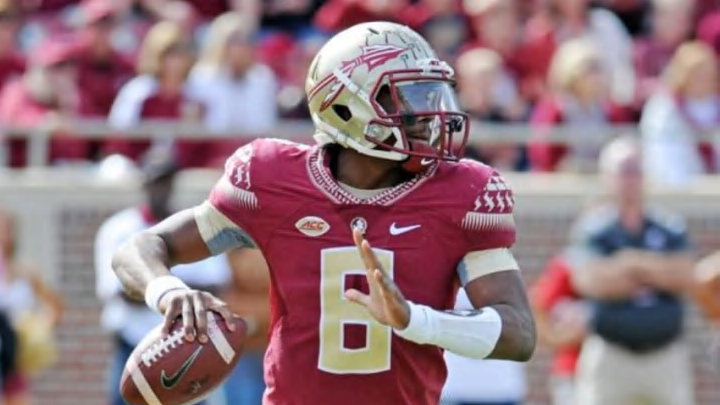For FSU football in 2015, accepting one of the most hyped graduate transfers didn’t turn out according to plans.
It was less than a year ago that the eyes of the college football world were focused squarely on Tallahassee, Florida and the newest player transferring into the FSU football program. When Everett Golson made the decision to become a graduate transfer from Notre Dame and join the Seminoles, there was plenty of debate about what it would mean for the program during the 2015 season.
As expected, it took some time for the offense to click with a new quarterback, who was just four months into operating the system, under center. For the first half of the season (despite the ‘Noles being unbeaten after the first seven games), plenty of FSU football fans wondered if Golson’s transfer was a positive thing for the program. Others (like myself) stood behind Golson saying that he was the best athlete at that position and the best option at the time (something I still believe).
Alas, the Everett Golson experiment didn’t go as planned. After missing the Syracuse game with a concussion reportedly suffered the week before in the first loss of the season against Georgia Tech, Golson lost his starting job to Sean Maguire. He would gain the job back following the team’s second loss of the year against Clemson, but would promptly hand it over for good following a disastrous first half against N.C. State and settle for mop up duty in a win over Chattanooga.
As it turns out, that would be the last we would see of Golson in a FSU football uniform, as he didn’t play against Florida and did not travel with the team for their Peach Bowl loss to Houston following the death of a family member. In the nine games that made up his career with the Seminoles, Golson threw for less than 1,800 yards to go along with 11 touchdowns and three interceptions.
More from Chop Chat
- FSU football: Q&A with Clemson experts at Rubbing The Rock 2023
- FSU football: 3 reasons Noles beat Clemson, two reasons they lose
- FSU football: QB Brock Glenn out with an injury for ‘a few weeks’
- FSU football: Which TV announcers will call Clemson game?
- FSU football: Is Jared Verse ready to make an impact versus Clemson?
Golson’s time in Tallahassee is the perfect example of why all schools (not just Florida State) need to be extremely careful with the “graduate transfer” rule enacted by the NCAA several years ago. Under the policy, players who receive their undergrad degrees from one FBS school can transfer to another FBS program without having to sit out a season. It was an effort from college sport’s governing body to look like they care about the education of athletes.
In reality, this college version of free agency has created nothing more than a roller coaster where the commitment toward an institution from the athlete means less and less. I will always stand behind the players who want to transfer when a coach leaves for another school within a year of them signing with that institution. But transferring because you aren’t getting the playing time you think you deserve is another subject all together.
Golson transferred from Notre Dame because the writing was on the wall that he was not going to be the Fighting Irish’s starting quarterback for the 2015 season. It’s the same reason Jacob Coker, after getting his degree from FSU, transferred to Alabama following the 2013 season. For some, it appears as if the players are abandoning ship just because they don’t want to compete.
Don’t get me wrong…if Leonard Fournette wants to graduate early from LSU and join forces with Dalvin Cook to make the greatest backfield in the modern history of college football, I would be tempted if I was Jimbo Fisher. At the same time, however, there would be a buzzer that would go off in my head (as it likely would for others) that would signal the potential difficulties with such a move…especially when it’s done just months before the season while other team members have been working for years on the proper chemistry needed to perform on Saturdays.
Is it a good thing that the player is at least getting a college degree before they head to their second program? Of course (though it would be interesting to see how many of those degrees are in what would be considered lightweight majors just to get the degree and be able to move on). But all coaches and programs, including the Florida State Seminoles, would be well served by thinking twice about the motives behind a player wanting to become basically like a leased car for a new program.
